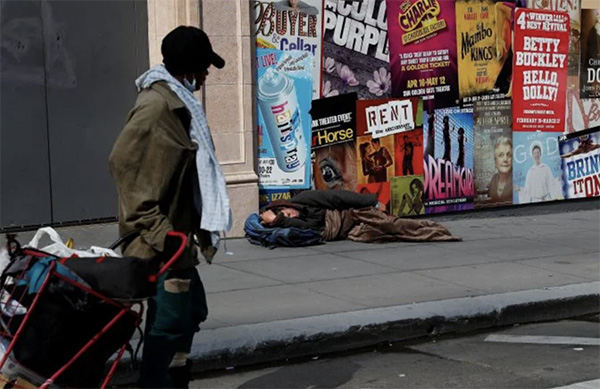
NEW YORK — Lorena Melgarejo remembers a time after her husband died that she couldn’t always be there for her three-year-old child because she couldn’t lose her income.
“I had to make the sacrifice to go out into the workplace so that I could pay for rent, pay for the debt that the hospital bills left, and pay for childcare for my child instead of being there to take care of my own child after the traumatic death of my husband,” said Melgarejo, executive director of Faith in Action Bay Area in San Francisco.
“This is the story of so many people and I personally think that having people be able to count on some money coming in gives you some peace of mind.”
Melgarejo told the story as an example of a circumstance where a child tax credit is beneficial. The comments were part of a Georgetown University Initiative on Catholic Social Thought and Public Life online discussion Tuesday, “Overcoming Poverty as a Moral Imperative and National Priority: Towards ‘A Better Kind of Politics.’”
Child tax credit was a key part of the discussion. In the Biden administration’s COVID-19 relief package — known as the American Rescue Plan that passed the House of Representatives last week — the child tax credit would increase to $3,000 per school aged child for 2021, and $3,600 annually for children under the age of 6.
It’s a $1,000 (or $1,600) increase from the 2020 child tax credit that provides $2,000 per child. The new plan would also make the credit payable in monthly installments of $250 and $300, opposed to once a year.
Robert Doar, president and Morgridge Scholar at the American Enterprise Institute, is concerned that as a result of monthly payments “people will work less and lose what they had gained in earnings, and not make it up in what they’re getting in benefits.”
He’s also concerned that parents will lose “that connection that comes with interacting with other people” in the workplace. And as a local social services worker, he worries that turning to direct benefits from the federal government with no human interaction isn’t the best way to serve struggling Americans.
Maria Cancian, dean of the McCourt School of Public Policy at Georgetown University, however, countered that instead of incentivizing people to work less, an increased child income tax that continues even after 2021 would provide people with a benefit to keep working, and use the credit as additional income.
“If children and families have good choices and an adequate safety net when they’re faced with bad luck or mistaken judgement then we will reap the benefits as a country,” Cancian said.
In addition to a child tax credit, Cancian said it would be beneficial to make work more attractive and manageable with a higher minimum wage and sick leave.
There’s been conversation around a nationwide minimum wage increase to $15 an hour as part of the American Rescue Plan in recent weeks. However, the Senate parliamentarian ruled that such a wage hike didn’t meet the requirements that Democrats must follow to pass the relief package without Republican support.
Doar pointed out the Congress Budget Office “has shown twice that would reduce employment in low-income communities and employment matters.”
“It may be too low, but $15 is probably too high if we’re trying to help people who struggle the most,” Doar said.
Marc Morial noted that 29 states have already increased their minimum wage above the federal minimum of $7.25. The states with the highest minimum wage are Massachusetts, Washington and California at $13.50, $13.69 and $14 an hour respectively. Washington D.C. has a minimum wage of $15 an hour.
“What anyone will tell you, that’s not the best economic policy, to have differential minimum wages, particularly for companies that do business across state lines. That a single minimum wage, which was the policy in this country for many, many years, is the way,” Morial said.
Morial went on to point to the racial disparities that exist when it comes to poverty rate, unemployment rate and home ownership rates in the country.
“There’s a strong intersection that poverty, as cruel as it is, is more severe among Black Americans, more severe among Brown Americans. Being ill-housed, as severe as it can be, is more burdensome to more Black Americans in a sense of being proportionate to the population than white Americans,” Morial said.
Morial, Melgarejo and Cancian all said it’s important for people to think about what kind of nation America wants to be.
Melgarejo cited the time she met Pope Francis and he told her that it’s important to “stay close” to impoverished people, that “they will teach you and they will not lead you astray.”
Doar said it’s important to help those in need so they can have “flourishing and positive lives.”
“We need to constantly recognize that everyone has dignity, and everyone has potential, and we should celebrate the first and maximize the second. And I stress that a little bit because I think sometimes we focus only on material resources, money and income, but reducing poverty in America is going to be about a lot more than that,” Doar said.
